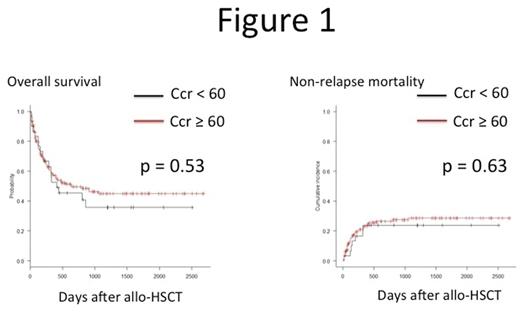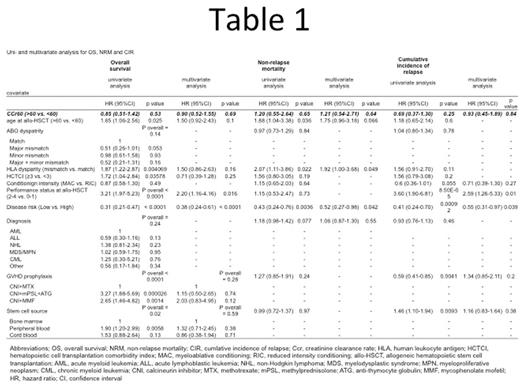Abstract
Introduction: The creatinine clearance rate (Ccr) is a more accurate indicator of renal function than serum creatinine. There remains a paucity date of prognostic value of mild to severe renal impairment calculated by Ccr for patients who underwent allogeneic hematopoietic stem cell transplantation (allo-HSCT). Herein, we evaluated the transplant outcome of patients with mild to severe renal dysfunction and compared to those without renal dysfunction.
Patients and methods: A total of 186 patients (118 male and 68 female; median age, 50 years; range 15-70 years) with hematological malignancies who underwent first allo-HSCT in our institution between 2008 and 2015 were retrospectively collected from medical records. Transplant outcomes were compared with regard to renal function before allo-HSCT. The threshold of renal dysfunction was 60 ml/min (Ccr < 60) calculated by Ccr. Overall survival (OS) was estimated by Kaplan-Meiyer. Engraftment rate, cumulative incidence of relapse (CIR), non-relapse mortality (NRM), acute graft-versus-host disease (aGVHD), chronic GVHD and acute kidney injury (AKI) within 100 days after alo-HSCT were calculated using Grayfs method. Factors associated with significance (p < 0.1) on univariate analyses were subjected to multivariate analysis. Multivariate analysis was performed using the Cox proportional hazards regression model for OS and Fine-gray proportional hazard regression model for NRM and CIR.
Results: Among the 186 patients, renal dysfunction (Ccr < 60) was observed in 30 patients (16%) before conditioning regimen. We observed no significant difference between Ccr < 60 group and Ccr ≥ 60 group in terms of clinical characteristics including gender, HLA disparity, stem cell source, disease risk, comorbidity, performance status at allo-HSCT and GVHD prophylaxis. However, compared to Ccr ≥ 60 group, patients with Ccr < 60 group were significantly older (p = 0.0008), lower estimated GFR (p < 0.0001), higher serum creatinine (p < 0.0001), more cases diagnosed non-Hodgkin lymphoma (p = 0.0003) and more cases received reduced intensity conditioning regimen (p = 0.002). All but one patient with CCr < 60 group achieved neutrophil engraftment median 15 days (range, 9-24) after transplantation (engraftment rate 97%) and 1 patient died before engraftment. Regarding the transplantation outcome, no significant difference was observed in OS, CIR, NRM, aGVHD, cGVHD and AKI after allo-HSCT between 2 groups (Ccr < 60 vs. CCr ≥ 60; 2-year OS, 45% vs. 49%, p = 0.6, 2-year CIR, 41% vs. 30%, p = 0.3, 2-year NRM, 23% vs. 26%, p = 0.6, day-100 AKI, 57% vs. 63%, p = 0.6, Figure 1). Multivariate analysis demonstrated that Ccr < 60 before allo-HSCT was not an independent prognostic factor for OS, CIR and NRM (Table 1).
To investigate the impact of mild to severe renal failure on the transplant outcome, we next explored the clinical results of 30 patients with renal failure more in detail. Of them, 13 patients (43%) had estimated GFR < 60 ml/min/1.73m2 and only 5 patients (17%) had a serum creatinine level > 1.2mg/dl. Two patients (7%) developed end-stage renal failure requiring dialysis. Eighteen patients (60%) died at a median 194.5 (range, 15-859) days after allo-HSCT. Relapse of the primary disease was the leading cause of death (n=9) and cause of NRM were infection (n=3), veno-occlusive disease (n=2), respiratory failure (n=2), cGVHD (n=1) and central nervous system complication (n=1). No patients died from renal failure. All patients with severe renal dysfunction defined as Ccr < 40ml/min (Ccr; 13.4 ml/min, 36 ml/min and 36 ml/min) died 17, 15 and 72 days after allo-HSCT, respectively.
Conclusion: Our cohorts with total 186 patients underwent allo-HSCT showed that mild renal dysfunction defined as Ccr < 60 ml/min before allo-HSCT did not affect adversely for transplant outcomes. In line with previous reports, Ccr could detect renal impairment that could not identified by GFR estimated from serum creatinin. On the other hand, no patients with severe renal dysfunction could survive after allo-HSCT. To our knowledge, the current study includes the largest number of patients with Ccr < 60ml/min. However, our small experience clearly desires larger series patients for evaluating the real impact of mild to severe renal dysfunction before transplantation.
No relevant conflicts of interest to declare.
Author notes
Asterisk with author names denotes non-ASH members.



This feature is available to Subscribers Only
Sign In or Create an Account Close Modal